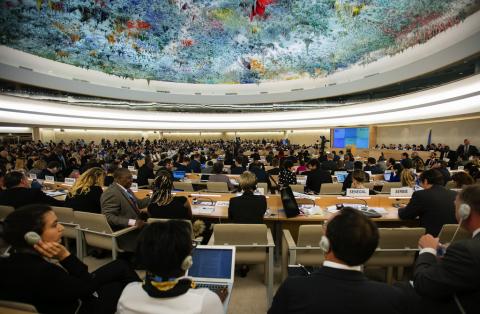
(Geneva, September 20, 2018) – On September 19, 2018, Assistant UN Secretary-General (ASG) Andrew Gilmour presented the annual report on reprisals against individuals who cooperate with the UN as part of an interactive dialogue with the Human Rights Council (HRC) in Geneva.
In his opening remarks, the ASG highlighted three “particularly disturbing trends” with regards to the issue of reprisals, one of which being the “use of accreditation and security procedures” to obstruct civil society’s participation with the UN, calling on the mechanisms involved to ensure they assess organisations “in a fair and transparent manner”. As one example of this trend, the ASG referenced the Alkarama Foundation’s denial of ECOSOC status in July 2017, following a resolution introduced by the United Arab Emirates (UAE) which alleged “connections to terrorism”.
The Alkarama Foundation – an NGO providing pro bono legal assistance to victims of human rights violations across the Arab world – closely monitors the human rights situation in the UAE, and has submitted numerous cases of violations in the country to the UN. In what the organisation believes to stem directly from its work and engagement with the UN human rights mechanisms, the organisation has been subjected to various forms of reprisals – particularly by the UAE. These include Alkarama’s designation as a terrorist organisation in 2014 by the UAE Cabinet, and the UAE’s subsequent introduction of a resolution before the ECOSOC to block the NGO’s request for special consultative status, overturning a positive recommendation from the ECOSOC NGO Committee.
In January 2018, the Special Rapporteur on human rights defenders, Michel Forst, and the Special Rapporteur on freedom of opinion and expression, David Kaye, expressed concern at “the denial by the Council of granting ECOSOC status to Alkarama which does not seem to be based on an objective assessment of facts, and may constitute an act of reprisal for their work and engagement with UN mechanisms in the field of human rights.”
Another trend highlighted by the ASG was states’ use of national security and counter-terrorism as justification for obstructing civil society’s access to the UN, noting the “systematic denigration” of human rights defenders and civil society organisations, which are labelled often as “terrorists” by governments. In the report, the UN Secretary-General (UNSG) emphasised that “terrorism is fundamentally the denial and destruction of human rights and the fight against terrorism will never succeed by perpetuating the same denial and destruction.”
The ASG also highlighted the broad range of reprisals used by states, and noted that such acts are often “disguised in legal, political and administrative obstacles”. For example, alongside measures such as travel bans and arbitrary arrests of individuals cooperating with the UN, selectively applied laws and policies as well as new legislation are being used to limit the operations of organisations likely to cooperate with the UN as a method of shrinking civil society space.
The ASG emphasised that reprisals against individuals cooperating with the UN are “unacceptable” and “contrary to the principles” of the UN, recognising that “intimidation and reprisals happen even under our noses in the diplomatic hallways of UN headquarters in New York and Geneva.” He stated that reprisals are used both to punish individuals and groups for their participation with the UN, but also to deter others from doing so in the future. “Intimidation and reprisals send a chilling message to others to discourage participation with the UN,” he said.
In his closing remarks, the ASG noted that the majority of the countries mentioned in the UNSG report spoke during the interactive dialogue, yet not one acknowledged acts of reprisals, and instead responded with “blanket denial”. While the ASG previously described it as “heartening” to see the commitment of the HRC to putting an end to the practice of reprisals, he noted that this does not appear to have translated into real action, as the practice continues unabated year after year. The ASG emphasised that “we have a long way to go before this odious practice is stamped out.”
For more information or an interview, please contact media@alkarama.org (Dir: +41 22 734 1008)
